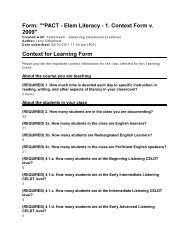The Tutoring Book - California State University, Sacramento
The Tutoring Book - California State University, Sacramento
The Tutoring Book - California State University, Sacramento
You also want an ePaper? Increase the reach of your titles
YUMPU automatically turns print PDFs into web optimized ePapers that Google loves.
) In case they believe to be excellent writers, point out that learning to write in a different mode<br />
will enrich their gift and quality of thinking.<br />
Introduction and <strong>The</strong>sis <strong>State</strong>ment<br />
Continental writers give poor previews of the exposition to come and are reluctant to reveal their thesis,<br />
using a strategy of avoidance. Duszak (1994) provides the following example of a Polish style<br />
introduction: “I am not dealing here with… Neither am I dealing here with … This attempt does not<br />
aspire to … but only outlines a problem.” Writing center tutors should not press continental writers to<br />
come up even with a tentative thesis and stick to it; usually, European writers perceive the idea of a thesis<br />
as limiting their thinking and their process of interpretation. Instead:<br />
a) Negotiate the need of some kind of hypothesis rather than thesis.<br />
b) Talk about “evolving thesis” and recommend the thesis to be stated at a later stage of the writing<br />
process.<br />
c) Negotiate stating the thesis at the end of the paper if the writer seems to be capable of managing<br />
the paper this way<br />
Organization and Cohesiveness<br />
Knowledge, not the structure, is idealized in the continental tradition. <strong>The</strong> way knowledge is conveyed in<br />
continental academic texts presents a demanding task for the reader. European students are not trained to<br />
write for an audience, nor do they care to make their text more “marketable” within the academic<br />
discourse community. To negotiate more explicitness and better organization, try the following:<br />
a) Do not to be irritated of European elitist approach to academic writing.<br />
b) Involve them in an honest conversation about more democratic ways of presenting knowledge<br />
Voice<br />
Continental academic writers tend to appear wary of committing themselves fully, without hesitation and<br />
reserve, to their statements, propositions, and suggestions. In other words, they formulate their<br />
pronouncements in a far less assertive, direct, and matter-of-fact tone than English writers usually do.<br />
This high degree of hedging also implies a certain modesty of understatement. Consider the tone and<br />
voice in a following example provided by Duszak (1997) and written by a Czech academic writer:<br />
I know only too well how much I expose myself to the danger of being accused to be again<br />
humming the same, old tune. I do not want to deny that the research into the problems of written<br />
language and into its particular status, as opposed to that of spoken language, has been one of the<br />
subjects repeatedly attracting my attention. And each time I was fairly and honestly convinced I<br />
would never take up the subject again.<br />
I would not recommend avoiding pressing the issue of the assertive academic voice; instead, acknowledge<br />
the difference between the two writing traditions and your understanding of the struggle of the continental<br />
writers to adopt a more assertive tone.<br />
My Best Tip: From the very first tutorial, writing center tutors should make the differences between the<br />
Anglo-American and the continental writing traditions explicit. Although the rules of the Anglo-<br />
American mode of writing have been explained to students in their writing classes, continental students<br />
need to build an awareness of their own modes of writing in order to transition to American mode of<br />
writing. Only this way they may see the academic writing in an American university not as oppressive<br />
and limiting mode, but as a different and enriching experience.<br />
103

















